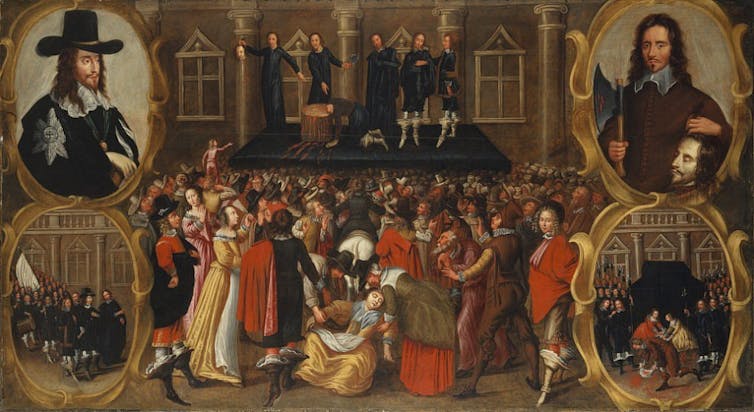In the final hours of the Conservative Party conference, the speech of the attorney general, Geoffrey Cox QC, was rapturously received. To the delight of a packed audience, he reminded delegates of the “prize” of Brexit – in his view, to restore the “power” to make laws “to the sovereign parliament of Great Britain and Northern Ireland”.
To reinforce this point, at the very end of his peroration, Cox quoted John Milton’s Areopagitica:
Methinks I see in my mind a noble and puissant Nation rousing herself like a strong man after sleep, and shaking her invincible locks: Methinks I see her as an Eagle mewing her mighty youth, and kindling her undazl’d eyes at the full midday beam.
“Ladies and Gentlemen,” Cox went on, “let us seize that prize!” Thanks to his speech – which also quoted the Rolling Stones – Cox has been hailed in the press as the “break-out star” of the conference.
Milton might seem a curious choice for a Conservative attorney general. After all, in 1649 he defended the execution of Charles I and served as Oliver Cromwell’s secretary for foreign tongues. And the context of Milton’s quote compounds matters. When Cox condemns the EU Parliament and European Court of Justice for threatening British sovereignty, surely he is not comparing them to Charles I’s Royalist army besieging London? Yet this is what Milton is describing at the beginning of the paragraph from which Cox takes his few lines.
But Areopagitica has resonances for today’s political situation. First, it was written at the height of the Civil War – and, when Cox invoked it, he was also addressing a nation much divided, but this time by Brexit. Whereas the culture wars of the 1640s played out on battlefields across the land, contemporary ones largely take place on Twitter – although the murder of Jo Cox MP should remind us of the real presence today of political violence, especially around Brexit and immigration.

Second, Milton’s tract was written to intervene at a moment when previous forms of information dissemination and authority had fallen apart and what was to replace them was unclear. Where today, the dominance of “vertical” major media outlets is under threat from “horizontal” forms of information such as social media and blogs, in the early 1640s, centralised licensing and pre-publication censorship was giving way to widespread pamphleteering.
It was not just a question of power – and having control of the means of publication – but of legitimacy: of whose views could be disseminated. In the words of Michael Gove from June 2016: “People in this country have had enough of experts.”
In defence of free speech
One of the consequences of the abolition of the Star Chamber in 1641 was that there was effectively no censorship. Set up in the 15th century to bypass corrupt local courts and implement state policy, the Star Chamber had become a concentration of power, sidelining parliament and imposing censorship.
In the void left by its dissolution, there was an explosion of print publications of all different kinds (interestingly, this led to a sudden increase in women publishing). But freedom of speech was hardly at the heart of parliamentarian ideals – with propaganda and heterodox religious views now easily disseminated in print, what parliament needed was its own system of control. This is exactly what they got in the shape of the Licensing Order of June 14, 1643, which reimposed pre-publication censorship.
Milton’s tract of 1644 was a response to this – and, fittingly, his defence for “the liberty of unlicensed printing” in Areopagitica was itself unlicensed, flouting the laws it protested against. Milton argued for the freedom to publish without censorship. If, after publication, a text was found to be libellous or seditious, then due punishment could ensue – but the text should have its chance. As he wrote: “Give me the liberty to know, to utter, and to argue freely according to conscience, above all liberties.” This is not to say that Milton was advocating freedom of speech for its own sake – the purpose of free argument was to “honour Truth”.

Fundamentally, Milton was arguing that difference of opinion was necessary for the healthy functioning of a society, and that society needed ways of articulating these differences. These should not be suspended when the country was threatened – in fact, the opposite. It was when the nation’s well-being was most under threat that people should:
Bestow upon the solidest and sublimest points of controversie, and new invention … casting off the old and wrincl’d skin of corruption to outlive these pangs and wax young again, entring the glorious waies of Truth and prosperous vertue.
Will of the people?
Yet when Geoffrey Cox quoted Areopagitica, his interest was not freedom of expression, but sovereignty. What does Areopagitica have to say about sovereignty? Certainly not that we should uphold the “will of the people” – Milton defends “disputing, reasoning, reading, inventing, discoursing, ev’n to a rarity,” and resists the idea that a “people” could ever have a single “will”.
Indeed, for Milton, it is openly expressed argument among the people, and not an artificially imposed unity, that brings political strength. Milton’s primary concern is individual, not national, sovereignty. He’d have had little patience for claims that disputing a government’s stance during crucial negotiations was merely “playing politics”.
So is Cox, through his quote, subtly asking us to continue our disputes, in the name of “Truth”? Or did he simply alight upon a phrase by a great Englishman that conjured up images conducive to a very different message?

